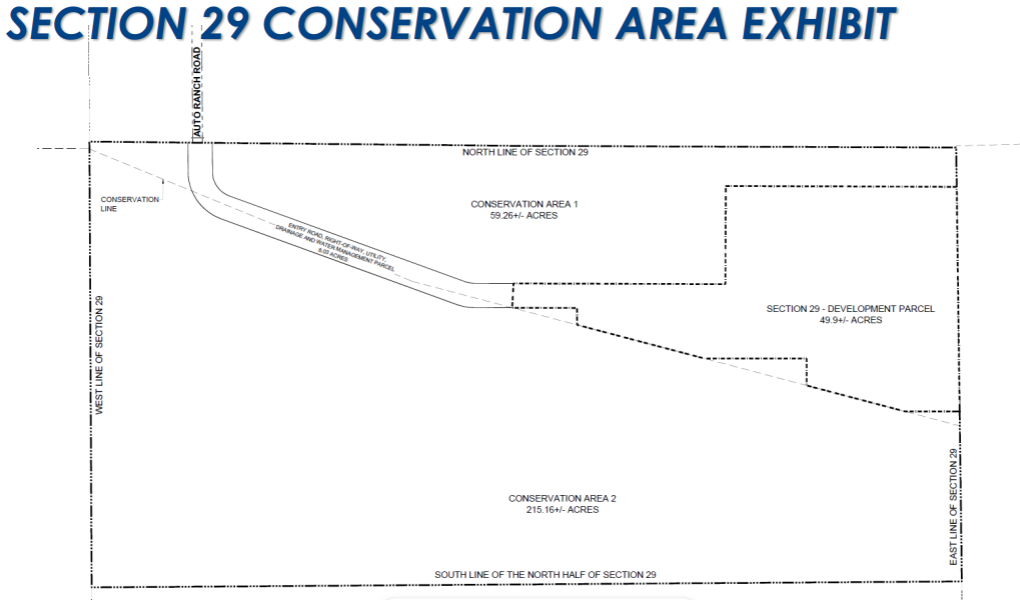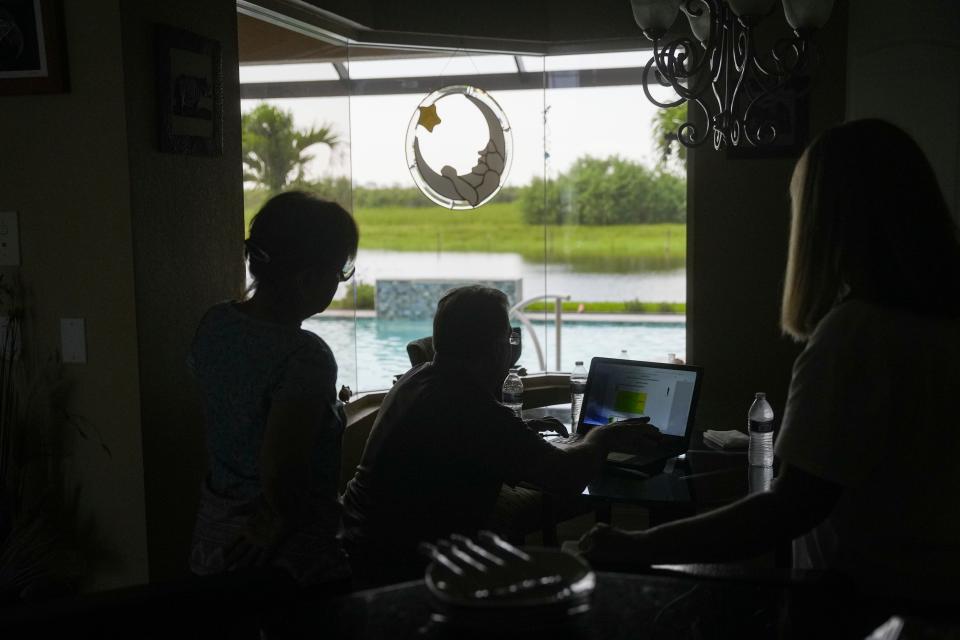Collier board once again continues hearing on controversial apartments in conservation area

The Collier County Planning Commission once again continued a hearing on a developer's controversial proposal to build apartments in a conservation area at Fiddler's Creek.
The decision on Thursday followed hours' worth of organized, detailed and passionate testimony from neighbors, and their legal counsel and experts.
Rich Yovanovich, the developer's land use attorney, pointedly cross examined the other side's experts, picking apart their testimony and credentials, in an effort to weaken the opposition's case. At times, during rapid-fire questioning, both sides became agitated.
The opposition's experts included Dan Trescott, a local planning consultant, who testified that the project was "a bad idea," with the land sitting so low, and within a coastal high hazard area prone to flooding.
"I would say it's got a problem. It's getting flooded really easily," Trescott said.
He added: "If people don't evacuate, cars will get flooded," as seen in coastal areas during Hurricane Ian.
He described the project as an island, with a "causeway to it," saying it would only increase the county's hurricane evacuation times, which are already too long because routes are deficient.
He asserted the site didn't make sense from a logistical standpoint for workforce housing, either.
"It's just not the right place," he said. "It should be located where the work is. Where they (the workers) have to be."
In case you missed it: Collier board continues heated hearing on proposal to build apartments in conservation area
And: Proposal to build apartments in a conservation area at Fiddler's Creek sparks concern, ire
Continuation requested after personal attacks
Late in the afternoon, after much back and forth, Yovanovich asked for a continuation of the hearing, to give him more time for his rebuttal. The rebuttal, he warned would be long – after opponents made so many personal attacks against him, his client and his experts during their formal presentations.
"They basically called us liars," he said, with frustration. "And I think we should be given a chance to respond."
He argued there had been many unfair and inaccurate statements made about the developer's true intentions, which he planned to refute.
Before giving his rebuttal, Yovanovich insisted he needed time to review the transcript from the day's hearing, so he could be better prepared to respond to what he saw as unjust accusations, assertions and attacks.
The continuation came more than five hours into the meeting.
The hearing was continued from a few weeks ago, when it ran long, then ended a bit abruptly, with emotions and tensions running high on all sides.
Now, the meeting won't resume until July 18, due to scheduling conflicts, and based on the limited availability of commission chambers.
Commission chairman Edwin Fryer warned the hearing could extend two more days, depending in part on how long the advisory board's deliberations take before it reaches a conclusion on whether or not to recommend approval of the developer's three petitions.
Fryer tried to speed the hearing along on Thursday, by encouraging speakers not to be repetitive in their arguments, saying it wouldn't help their case, and that commissioners had a good handle on what had already been presented.
While they've not yet made their decision, several planning commissioners have raised major issues with the project, suggesting they're not likely to support it.
No matter the board's recommendation, county commissioners will make the final decision.
Developer wants to build hundreds of luxury apartments
Naples-based Gulf Bay Group of Cos., the developer of Fiddler's Creek, wants to build hundreds of luxury apartments on a slice of a 600 acre-plus property, known as "Section 29," that neighbors believed would remain untouched by residential or commercial development in "perpetuity," or forever.
Of 750 proposed apartments, 225 would be rent-restricted, to provide more affordable, workforce housing, addressing a critical shortage in the county.
Conceptual plans for the apartments show a four-story complex (over parking), with multiple buildings, at a zoned height of 55 feet and an actual height of 69 feet.
Building the project will require changes to the county's growth management plan, as well as the planned unit development and the development order for Fiddler's Creek.
In the planned unit development for Fiddler's Creek, parts of the land are designated for parks and recreational uses, which could include everything from a golf course to an equestrian center, and instead the developer wants to build apartments, with affordable housing that's sorely needed, Yovanovich said.
Under the proposal, he said, the "park parcel" would become the "housing parcel."
The opposition put on a strong case, pointing to past promises made by the developer and his representatives, including a former attorney, not to build homes on the environmentally sensitive land, and to protect it through conservation easements, during public meetings, going back to the 1990s.
The easements were required by the US Army Corps of Engineers to build in the final sections of Fiddler's Creek – made up of the eastern part of Oyster Harbor and the entirety of Estancia, due to their impacts on wetlands and wildlife. Those plans included up to 1,650 single-family and multifamily homes, a golf course and commercial uses, such as a grocery store, on 804 acres.
Instead of easements, the developer recorded less restrictive covenants, years after that construction began, off Collier Boulevard.
On the first day of the hearing, Tim Hall, the developer's environmental consultant, said, in part, the recording didn't happen sooner because there were active negotiations with federal agencies to modify the conservation area, to allow a carve-out for development in part of Section 29.
In answer on Thursday, the opponents argued there weren't any such negotiations, and they pointed to evidence supporting their claims.
Neighbor John Erario, one of the most vocal and organized opponents, showed an email he received from a manager of environmental review for the U.S. Fish and Wildlife Service in Florida stating that he had "no indication" the agency had an agreement with the developer to "delay meeting the terms and conditions" of the biological opinion, which led to the required easements.
"I'll let that speak for itself," Erario said.
Additionally, the Fish and Wildlife representative wrote that if the terms weren't met, the developer would have been required to restart its consultation and review process with the service, which it didn't do.
The developer only recorded the conservation covenants after residents discovered it hadn't done so, then complained to the Army Corps, years after the fact, Erario said.
"The reality is they got caught," he said.
Yovanovich has disputed this fact, and others made by Erario and other neighbors.

Neighbors got emotional in making their case against the project
In other testimony, Erario accused Yovanovich of "blathering doublespeak," and orchestrating a game to misrepresent the truth in favor of his client.
In one instance, he claimed Yovanovich was trying to confuse the issue by suggesting Fish and Wildlife had expressed a willingness to grant the developer's request to modify the biological opinion, if Gulf Bay paid $1.6 million to buy 120 acres of land in Glades County for environmental protection to make up for the impacts of the new construction.
He pointed out that Yovanovich did not provide any evidence of the agency's offer, written or verbal, when he brought it up for the first time a few weeks ago.
Additionally, Erario pointed to a January letter from Fish and Wildlife denying the developer's request to release 57 acres from the agreed-upon protection area, so it could build on the land.
"That ship has sailed," Erario said. "There is no path to modify it. It's over."
In its letter of denial, Fish and Wildlife described the land targeted for the apartments as of "high ecological value to several species, including Florida panthers, Florida bonneted bats, and American crocodiles," and as important in protecting the watershed of the Rookery Bay National Estuarine Research Reserve.
That was "at odds" with what the developer's environmental consultant stated when he described its value as "at the lower end of the scale," due to its use for farming and grazing over many years, Erario emphasized.
He also suggested the developer's team presented misleading information to the planning commission when it emphasized there had only been six accidents reported in six years at the intersection of U.S. 41 and Auto Ranch Road, which is now just a rural, dead-end road that runs a little over a mile.
"It's a strategy that speaks for itself," Erario said.
Once expanded and extended to the apartment complex, Auto Ranch would have to support hundreds of cars turning in and out of it in a day, increasing the likelihood of accidents, and the dangers to residents living in single-family homes along it, including children riding their bikes or playing outside, Erario contended.
He questioned other parts of the developer's presentation, including images from what he called a "grossly manufactured viewpoint" that showed how the project would look from his neighborhood. The perspective was from the street in front of his house, rather than from a backyard that would overlook the apartments, such as his own.

At one point, chairman Fryer told Erario to take it down a notch, saying the board would not tolerate "ad hominem attacks," or attacks on character. Erario apologized, blaming it on his emotional state, then skipped over some of the more accusatory parts of his remaining remarks.
Neighbors feel 'very diminished,' unimportant
While some opponents ceded their time to others, the planning commission still heard from many angry residents, including John Erario's wife Susan Caglioti. The couple are part of a group, going under the name Protect the Preserve, that raised nearly $27,000 to fight the project through a GoFundMe campaign.
In her comments, Caglioti described the project as incompatible and unreasonable, due not only to its size and density, but its location in an area that was supposed to serve as a "buffer to urban sprawl."
"This was a line drawn in the sand," she said. "It was the buffer."
If not for the affordable housing, the project would not have moved forward, with support from county staff, and gotten this far, Caglioti said. She saw that as unfair, adding that she and other residents impacted by the development felt "very diminished and unimportant in the eyes of the county," and viewed as "somewhat of a throw away" by the developer.
Yovanovich had disputed the suggestion that the developer is any way trying to get around other provisions of the growth management plan or land development code by including affordable housing in its project.
In her testimony, Caglioti raised myriad concerns about the impacts of the development on everything from wildlife and flooding to traffic and hurricane evacuation. So did others in her neighborhood.
Neighbor Josette Riopelle provided lists of current and future affordable housing projects in the surrounding area. She pointed out there's the potential for 2,585 units to be located east of Collier Boulevard, off U.S. 41, and that none of them have or will require the rebuilding of a road, unlike the proposed project at Fiddler's Creek.
She said "common sense" should dictate that the existing, approved sites are much more suitable for workforce housing, not one requiring a change to a conservation area, or resulting in the destruction of preserves.
Lawrence Hanba, who also lives in Royal Palm Golf Estates, said as a retired defense lawyer, he thought the "unclean hands doctrine" should apply, barring the developer from getting what he's asked for, even if the project includes much-needed affordable housing.
He argued the promise to preserve Section 29 had been used as a "carrot," to obtain more development rights in Fiddler's Creek since 1998. He said the land had not been managed as required, seeing it as another broken promise.
In conclusion, Hanba said the developer should not be rewarded due to its past "misdeeds and transgressions."
"Their hands are not only dirty, but caked in mud," he said.
Several planning commissioners likely to vote no
In reply to Hanba's comments, planning commissioner Robert Klucik, an attorney himself, said the clean hands doctrine should apply if there's litigation, which there isn't, but it could be used to "inform" the planning board's decision. Because he had to leave the meeting early for a family event, he shared his thoughts on the petitions, not knowing if he'd be there for the vote, in case it happened later in the day.
Looking back at the county ordinance in 1998 that allowed the developer to amend its planned unit development to add 1,385 acres to Fiddler's Creek for its final phases, Klucik said there was only one way to interpret it, although Yovanovich has argued otherwise.
The commissioner's interpretation: That the county would be granted a conservation easement for parts of Section 19 and "all of Section 29," made up of about 693 acres in total. He disputed an argument by county staff that the conservation easement didn't have to be recorded because the land had yet to be platted, saying that was outrageous.
Platting is typically done by developers or landowners to make legal lots than can be bought, sold or built upon.
Klucik said he couldn't support the project, indicating he'd vote against it.

In response, Fryer said Klucik presented a "very good piece of lawyering," to explain his reasoning, based on the original county ordinance and state statute. He said he shared his fellow commissioner's concerns – and he would need "some persuasive arguments when the time comes" to vote, if he's to come to a different conclusion.
Besides neighbors, Brad Cornell, a policy director with Audubon Western Everglades, spoke against the project, saying his organization strongly opposed it. He argued it would go against the growth management plan, which should not be amended for it.
He said his group not only helped craft the protective rural fringe mixed use district 'neutral lands' designation on Section 29, but worked to defend it in court.
The fact that Fish and Wildlife had already determined a new biological opinion, or review, would be required before such a project could move forward, he said, would be another good reason for the planning commission to recommend denial.
He listed a handful of other reasons, including the fact that the developer had yet to submit a detailed stormwater management plan. He said the plan will be integral to protecting wetlands and wildlife, including wading birds.
"The site is inappropriate for development due to the offsite impacts to hydrology of surrounding conservation lands and preserves, as well as the adjacent communities. The staff reports note the stormwater management issues will require a 'comprehensive approach' to solve the stormwater management needs of the site. Such comprehensive drainage works will impact wetlands on and offsite. That plan has not been created and is not likely to solve the many low elevation flooding problems, short of bridging Auto Ranch Road," Cornell said.
The impact on panthers is another big concern for his group.

Planning commissioner suggests developer hasn't been a 'good neighbor'
Before the hearing ended for the day, commissioner Chris Vernon stated the county wouldn't be in the "unfortunate" position of considering such petitions if it had done a better job in providing affordable housing, which had been an issue for at least 20 years.
"It doesn't matter what meeting I go to," he said. "Affordable housing is the No. 1 issue."
He said the opposition had made compelling arguments against the apartments. While he has often complimented Yovanovich for working with his developer clients to ensure they are "good neighbors," he said it didn't appear that's the case this time around.
"It troubles me," Vernon said.
While he said he'll keep his mind open to more arguments from the developer's side, he said he's likely to vote against the project, based on what he's heard so far, unless he can be convinced otherwise.
His comment took Yovanovich a bit by surprise, saying Vernon's intentions seemed "a little clearer to me than usual," at this stage of the hearing process.
"I'm not giving you a final decision," Vernon assured. "I'm just telling you where I stand."
This article originally appeared on Naples Daily News: Hearing continued on controversial apartments in Fiddler's Creek - again

